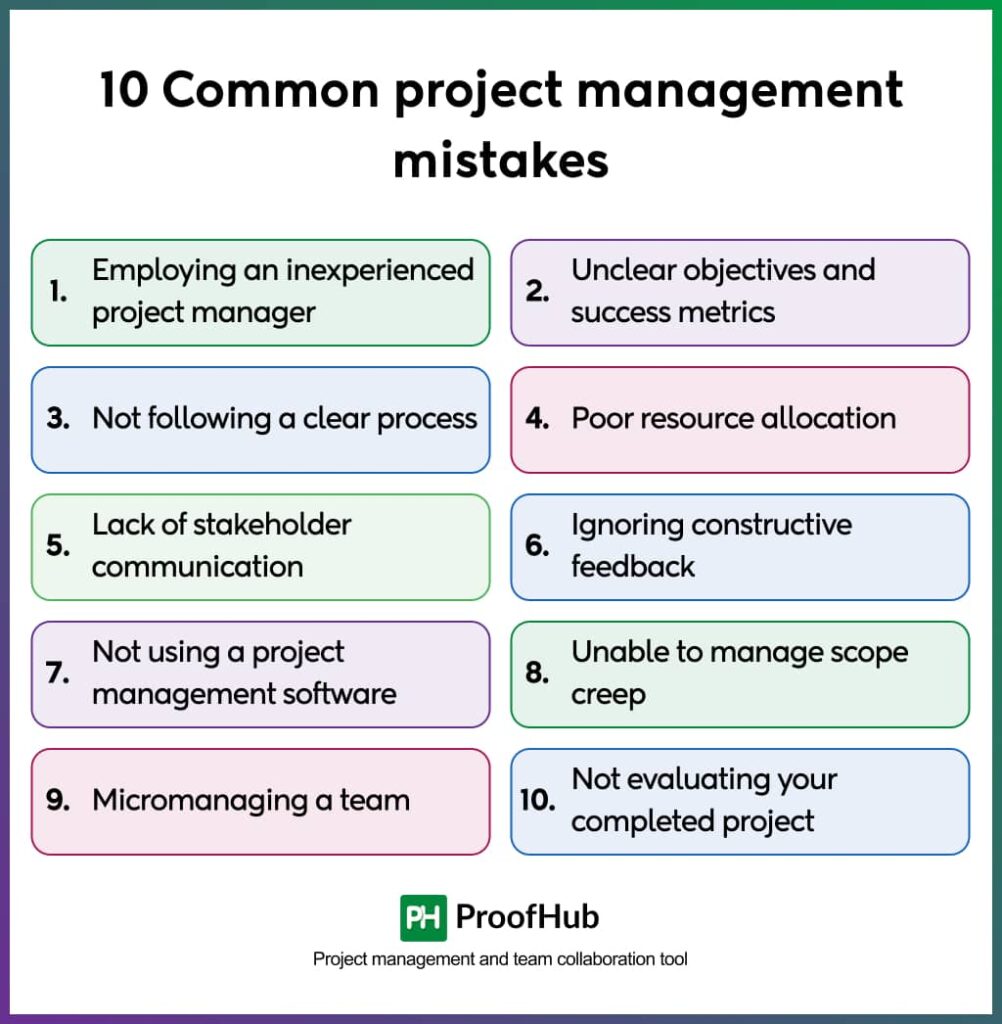Mistakes are the part of the job. It’s easy for even the most seasoned project managers to overlook the lurking dangers and commit mistakes. From poor planning to ineffective communication, these project management mistakes affect performance, cause delays, and, in some cases, lead to major failures as well.
In this article, we’ll explore common project management mistakes that a project manager should avoid.
10 Common project management mistakes and how to avoid them

1. Employing an inexperienced project manager
A project manager is the captain of a ship. He is directly responsible for the failure and success of a project. Getting an inexperienced project manager is like risking a project as every project comes with different requirements and needs to be handled differently.
If a project manager doesn’t know how to run meetings, develop a project plan, manage resources, and foresee risks, then nothing can save a project from being doomed.
Solution: It is wise to employ a project manager with a certain body of work and experience having skills in alignment with the requirements of a project.
2. Unclear objectives and success metrics
Most projects don’t fail because of improper planning or unwanted risks, they fail due to the lack of clear objectives and goals. After all, you can’t build a multi-story building on a weak foundation. If team members fail to understand project objectives well, they can’t deliver successful projects.
Most industry experts use a method called DUMB which stands for Doable, Understandable, Manageable, and Beneficial to define clear goals and objectives.
Solution: Before you start a project, use the DUMB method to define clear objectives and communicate them to team members.
3. Not following a clear process
If a project team is not following any process, things will get haywire in no time. Lack of structure is one of the common mistakes in project management that can lead to confusion, missed deadlines, and inefficiencies. You have to have a structure to keep the entire team focused. As a project manager, understand the needs and requirements of a project. Then, figure out a process and the best project management methodology for it.
Solution: Know your team members’ strengths and weaknesses before coming up with a strategy. Be picky while choosing a methodology as every project management methodology is best suited for projects of a specific nature.
4. Poor resource allocation
Improper use of resources whether its tools, team members, time, or finances tends to impact the success of a project. Effective allocation of resources involves identifying project requirements, assessing available resources, and allocating them wisely to maximize productivity and minimize waste.
Not using project resources efficiently can cause delays in project delivery, increase the cost of the project, decrease the team efficiency, hamper the morale of the team, and impact the quality of the project.
Solution: Prioritize resource allocation based on project priorities and critical path activities. You can also utilize resource management tools and software to streamline resource allocation processes and optimize resource utilization.
5. Lack of stakeholder communication
There is a popular saying that goes like this, “It’s always better to over-communicate than to under-communicate in project management.”
One of the common project management pitfalls is failing to engage stakeholders effectively, which can result in misaligned expectations, resistance to change, miscommunication, and project delays. Engagement with clients, sponsors, team members, and other relevant parties, is crucial for gathering feedback, and ensuring project success.
As a project is always undergoing developments on one front or another, deadlines can be met easier and faster if everyone is kept in the loop.
Solution: Identify key stakeholders and their respective roles and responsibilities. Choose a preferred way of communication – written, verbal, or face-to-face and stick to it. Be consistent with it so that team members and other stakeholders are well-informed of decisions, exceptions, and changes.
6. Ignoring constructive feedback
One of the most common mistakes that project managers make is failing to collect constructive feedback from team members. Without feedback, problems can go unnoticed and can affect project’s success.
Solution: Encourage a culture of open and constructive feedback within the team. Regularly ask for feedback on both the project’s progress and team collaboration. Use this to make changes and improvements while keeping the project on track to meet its objectives.
7. Not using a project management software
Smart project managers always know how to make the most of the technology and tools that come with it. Many successful companies use at least one or more project management tools to get things done faster.
The main purpose of using project management tools is to help managers plan, execute, and control all aspects of the project management process. Whether it’s a complex or simple project, you’d end up improving resource efficiency and project tracking with these tools, if used the right way.
Solution: ProofHub can replace the need to have too many tools for your business. It comes packed with powerful features such as online proofing, Kanban boards, Gantt charts, and dynamic reporting features. Check out its features here.
8. Unable to manage scope creep
In project management, scope creep is one of the biggest causes of project failure. It usually starts with a small change request which is followed by one more request. Then another and so on. As a project manager, it is your job to ensure that deliverables are under the budget and deadline.
Solution: One way to avoid scope creep is to start involving sponsors in the scope planning process. Offer your interpretation and ask for their suggestions and recommendations as well. Keep them well-informed in case of any new changes in the project.
9. Micromanaging a team
A good leader is someone who trusts his team members and gives them the freedom to make their own choices. As a project manager, that’s exactly what you need to do. Micromanaging your team could make employees rebellious and affect the work environment as no one likes to work under a controlling team leader or manager.
Solution: Set goals at the beginning and have periodic check-ins to determine progress. Be respectful of the working style of team members. Create a positive work environment and encourage honest dialogue.
10. Not evaluating your completed project
It is disappointing that many project managers tend to avoid evaluating a project once it’s done and dusted. Irrespective of the outcome, review the project at least once. Doing so will allow you to make note of all the learning points. Also, if similar issues arise in the future, you know how to handle them.
Solution: Gather for a brief meeting with project managers. Ask questions and document what went well and what didn’t. Think of new techniques and approaches that could have helped the project and other important factors. Keep them in a centralized place accessible to all.
Conclusion
These are 9 common mistakes that affect projects along with their solutions. With good planning and effective communication, these mistakes can be easily avoided. Tell us in the comments section what you do and how you avoid and tackle project management mistakes. We’d love to hear from you

